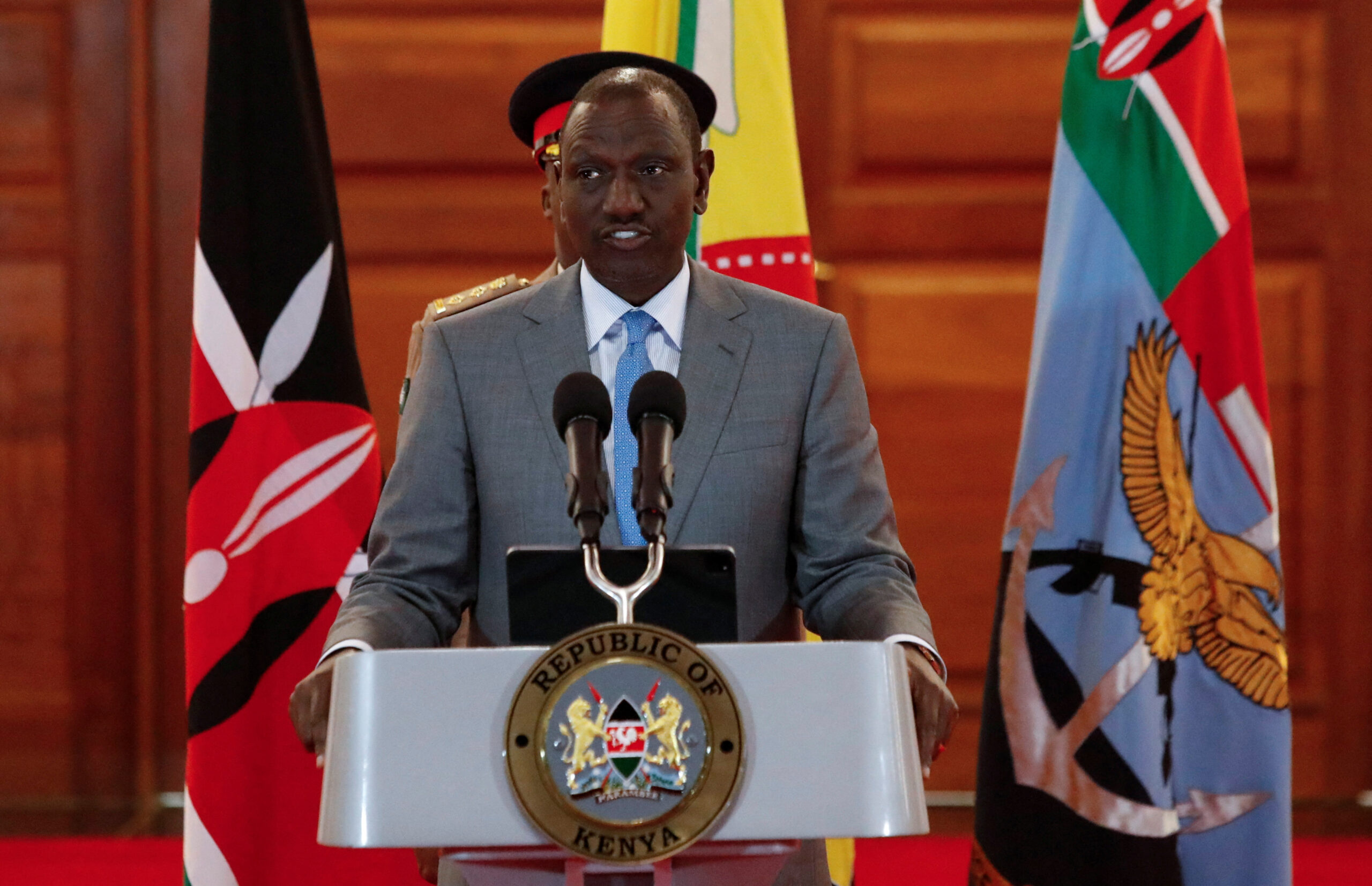
Protests in Kenya reveal Ruto’s disregard for domestic unrest
Kenya’s President William Ruto has met with global tech titans in Silicon Valley, wooed climate activists under the Eiffel Tower, and been toasted as a global peacekeeper in the White House in the two years since his election.
But while he was making dozens of visits abroad, his fellow countrymen were going through terrible economic times.
After days of protests, Kenyans persuaded Ruto to rescind his intentions to propose eye-watering tax hikes. Ruto was already under pressure from the country’s cost of living crisis and from witnessing people in power enjoy the luxury that comes with their positions.
The U-turn has revealed the disparity between Ruto’s public persona as the jet-setting global voice of Kenya and the continent as a whole and the harsh realities of his country, which are hampered by corruption, debt, and security concerns.
Politicians and observers argued that he has been left extremely weak domestically, with his opponents reenergized and trying to capitalize on the unrest ahead of the 2027 elections and his administration responding indivdually.
Former Kenyan Chief Justice Willy Mutunga told Reuters that “(Ruto’s administration) was bound to face the consequences of its priorities, being enslaved and supported by foreign interests, and never pro-people in its outlook and interests.”
“As long as the material interests of the youth are not addressed, the chasm grows bigger and bigger,” he stated.
Requests for comment from a Ruto representative were not answered.
Kenya, which already boasts one of the largest economies and strongest democracies in Africa, has increased its influence internationally in recent years.
Before the protests reached their peak, Ruto sent 400 police officers to head a stability mission in Haiti.
As the first significant non-NATO ally in sub-Saharan Africa, the U.S. has designated Kenya, granting it access to weapons and training without requiring it to participate in NATO missions.
Ruto has become a strong voice for Africa in calls for climate change action. He discussed the need to overhaul the global financial system to aid the poor at the G7 summit earlier this month.
Still, some observers claim Ruto’s administration is barely surviving in light of the nationwide protests that have broken out, even in Eldoret, the governor’s hometown, and the growing calls for his resignation.
According to diplomats and analysts, Western powers run the risk of losing one of their most powerful partners in the fight for influence in Africa—where they aim to challenge the rising strength of China and Russia—if Ruto devotes more time and effort to resolving domestic issues.
In an attempt to calm demonstrators’ anxieties, Ruto has promised to have talks, although it’s unclear whether or not those conversations would take place or with whom.
In addition, he needs to devise a fresh strategy to address Kenya’s economic problems, which will probably be difficult to sell given the deficit reductions he would have to make in order to satisfy foreign lenders’ need for continued support.
“This civil disobedience is a generation-defining moment, even if nationwide demonstrations fade,” stated Declan Galvin, managing director of the firm Exigent Risk Advisory, located in Nairobi.
“The next election is still several years away but Ruto clearly needs to shift his political position to address public needs for his own political survival.”
“BRAZEN ARROGANCE”
Although Ruto has a reputation for having a strong work ethic, he has found it difficult to overcome an International Criminal Court indictment for his involvement in post-election violence in 2007–2008, even after the court dismissed the case.
Ruto was described as “an incredible performer” by Gabrielle Lynch, a Kenya specialist at the University of Warwick in the UK. She noted that Ruto could provide statistics and facts to funders while simultaneously changing his tone and body language for a local rally that same day.
“It is as if presenting himself as a world leader would help legitimize him at home and remove tag of parochial instigator of violence,” Lynch stated.
Ruto’s extensive travels were highlighted by the fact that, in his first 20 months in office, he made 62 trips to 38 different countries, as reported by Kenya’s Daily Nation newspaper.
However, two people who are in regular touch with Ruto’s office claim that when he is at home, he has shown himself to be insensitive to criticism of the course the nation is taking.
After running on a platform of supporting low-income “hustlers,” Ruto’s opponents have now dubbed him “Zakayo,” which is the Swahili name for a rapacious tax collector found in the Bible.
Videos of politicians showing off their affluence went viral as demonstrations grew. Members of parliament who backed the tax increases have had their homes and companies targeted.
Makueni County governor and opposition member Mutula Kilonzo Jr. claimed that the “brazen arrogance” of public servants was what drove unrest.
Ruto’s budgetary measures have also incited anger toward the World Bank and the International Monetary Fund (IMF). Ruto needs to find a different way to reduce the amount of debt his country has, which is approximately $80 billion, or 70% of GDP, after backing off on tax increases.
SILVER FIST, PINK GLOVE
Under Ruto’s leadership, Kenya and the US have developed closer ties, although others argue that Washington’s perception of Kenya’s difficulties has been distorted by their mutual respect.
In May, Ruto experienced the first state visit to the United States by an African leader in more than 15 years. American assistance has been vital in the battle against Islamist extremists in Somalia.
According to diplomats in Nairobi, Ruto is considered as close to Meg Whitman, the current US ambassador to Kenya and a former CEO of eBay and Hewlett Packard. This connection has helped draw in international investment, especially American tech companies.
Distinguished Kenyan social activist Boniface Mwangi claimed that U.S. Secretary of State Antony Blinken’s call to Ruto following the violence was “too little, too late” and that Washington needed to adopt a more forceful stance.
According to a representative for the U.S. State Department, the embassy in Nairobi has continuously advocated for moderation and the observance of constitutional rights.
Mwangi claimed that last week, as the movement grew, he counseled the American embassy to use their clout to get the president to interact with the demonstrators.
“People had to die for them say something,” he stated. “They purchased this complete package with a delightful personality. They fail to notice that the silk glove conceals an iron first.”
All Categories
Recent Posts
Tags
+13162306000
zoneyetu@yahoo.com



